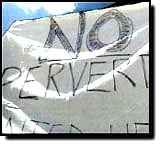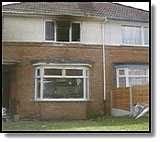
|
Broad Welcome for Government Guidelines on PaedophilesGovernment plans to give new powers to police to warn people about the movements of convicted and cautioned paedophiles have been widely welcomed. Chief police officers, probation officers and offenders' groups all praised the measures.However, concern has also been voiced that the measure could lead to more vigilante action, while some believe the Government plans do not go far enough. Under the guidelines issued by the Home Office, any decision to name an offender must be "justified on the basis of the likelihood of the harm which non-disclosure might otherwise cause". The guidelines stipulate that disclosure of personal information about individual offenders should be "exceptions to a general policy of confidentiality".
The Home Office minister Alun Michael said they were "an important step" in protecting the public, particularly children, from the activities of sex offenders. "I believe they strike the right balance between keeping a check on where sex offenders, in particular paedophiles, are living, while at the same time allowing them the chance to mend their ways in the community," he said. Each case will need to be assessed for the risk that the individual may pose. If necessary, the police will be able to pass on details to employers, voluntary organisations and even members of the public. "But we do not want to drive sex offenders underground where they could disappear from view, no longer receive the treatment they need, and pose a threat to yet more children," he continued. Under the guidelines, if an offender is living near a school, a day nursery or a playgroup, police will be able to inform the local education authority, the head teacher or the playgroup leader.
Police could also step in if an offender is helping with the running of a youth group by informing the church authorities or governing body running the group. The guidelines warn of the danger of handing out information "gratuitously" and says that disclosure of information about offenders to members of the public must only happen when an assessment of the risk shows it is "appropriate and necessary".
Warning of Vigilante Action"The result of it not saying that is that it becomes a first option rather than a last option, and it may give rise to police forces delegating their responsibility by giving information to specific members of the public and beingable to say afterwards: `We told members of the public'. "This would be a derogation of the police's duties to ensure they policed suspected people," Mr Solley warned. "It may also have the tendency to cause more crime because, if you tell members of the public, there are real dangers that they may not be capable of keeping the sort of levels of secrecy required, other people get to know, and before you know it, other crimes are committed by vigilantes."
But John O'Sullivan, whose son was the victim of a paedophile and who now runs Parents Against Child Abuse, with some 4,000 members, told the BBC's The World at One programme that the new rules were not sufficient. "It's a move in the right direction but it doesn't go far enough to protect children. At the moment, children aren't being protected in this country." he said. He claimed the measure would increase vigilantism: "We will only tolerate so many children being murdered in this country," he said. "It's not going to help them. These paedophiles are going to come out in a couple of months and telling social services that this paedophile's in the area - they know already. It's the parents who need to know."
The new guidelines were given a qualified welcome by the Association of Chief Police Officers, which emphasised that decisions must be taken on a case-by-case basis. "There are understandable pressures for the general public to be made more aware in these cases and the protection of children and other vulnerable people is paramount but any action must be taken in such a way as to add to that protection, rather than endangering it," said the ACPO crime committee spokesman, Gloucestershire Chief Constable Tony Butler. The guidelines are tied to the launch of a national register of sex offenders which has been set up under the Sex Offenders Act passed under the previous government. Anybody jailed for a sex offence for more than 30 months will be entered on the register for life, while those with lesser sentences will be registered for five to ten years. The National Association of Probation Officers warned that there were "serious limitations" to the register. Assistant general secretary Harry Fletcher said it would only scratch the surface of the problem, as Home Office research suggested there were 110,000 men in England and Wales who had committed a serious sex offence against a child while the National Criminal Intelligence Service had the names of 25,000 suspected or convicted paedophiles. "Paedophiles are an extremely difficult group to work with, many have changed their identities on several occasions over the last 12 months, yet the onus would be on the offender to register any change of circumstances with the police," Mr Fletcher said. "Given the devious nature of the offending, in many instances this will not happen."
|
Diana, Princess of Wales, 1961-1997
Conference 97
Devolution
The Archive
News |
Issues |
Background |
Parties |
Analysis |
TV/Radio/Web
Interactive |
Forum |
Live |
About This Site
News |
Issues |
Background |
Parties |
Analysis |
TV/Radio/Web
Interactive |
Forum |
Live |
About This Site
© BBC 1997 |
politics97@bbc.co.uk |



